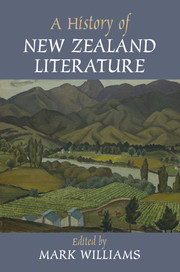Book contents
- Frontmatter
- Contents
- Notes on Contributors
- Acknowledgments
- Introduction
- PART I 1760–1920
- PART II 1920–1950
- PART III 1950–1972
- 11 Against the Social Pattern: New Zealand Fiction, 1950–1970
- 12 Janet Frame: Myths of Authorship, 1950–1990
- 13 Te Ao Hou: Te Pataka
- 14 Out of the Drawing Room and onto the Beach: Drama, 1950–1970
- 15 ‘Physician of Society’: The Poet in the 1950s and 1960s
- PART IV 1972–1990
- PART V 1990–2014
- Index
12 - Janet Frame: Myths of Authorship, 1950–1990
from PART III - 1950–1972
Published online by Cambridge University Press: 05 April 2016
- Frontmatter
- Contents
- Notes on Contributors
- Acknowledgments
- Introduction
- PART I 1760–1920
- PART II 1920–1950
- PART III 1950–1972
- 11 Against the Social Pattern: New Zealand Fiction, 1950–1970
- 12 Janet Frame: Myths of Authorship, 1950–1990
- 13 Te Ao Hou: Te Pataka
- 14 Out of the Drawing Room and onto the Beach: Drama, 1950–1970
- 15 ‘Physician of Society’: The Poet in the 1950s and 1960s
- PART IV 1972–1990
- PART V 1990–2014
- Index
Summary
It can be argued that Janet Frame has appeared, in the decade following her death on 29 January 2004, as the latest in a line of mythmakers spawning narratives about her life and work. This was in part the outcome of the impressive corpus of posthumous publications released by the Janet Frame Literary Trust, including a volume of correspondence and an autobiographical novel that further documented the public's perception of the writer's personality. Then a volume of collected essays and nonfictional pieces, significantly entitled Janet Frame: In Her Own Words, aimed to strengthen this sense of a finally established correlation between the written oeuvre and the author's intentions, by dispelling some of the more ‘stubborn myths built up around her’, including the notion that she never expressed personal opinions about her work. Such myths, the editors of In Her Own Words suggest, should finally make way for an alternative perspective that the author may fully occupy, like those of her characters who inhabit ‘warm first person country’ in the rare moments of self-realisation staged in her fiction. This impulse to conflate authorial intentionality and lived subjectivity in fact coheres with the project inscribed in Frame's autobiography, a trilogy published in the 1980s and repeatedly described by the author in terms of a desire ‘to make [herself] a first person’ after years of alienation when she was viewed as ‘a third person – as children are’. Indeed she claimed that children can be seen to constitute an ‘oppressed minority’, referred to as ‘“they” until they grow up’; so that the publication of the autobiography, in which she narrates the story of her life from her own self-conscious viewpoint, amounted to an affirmation of maturity. It came across as an author's endeavour to seize hold of the perspective over her own life story after it had been confiscated by generations of scholars allegedly claiming to know Frame better than herself. The posthumous legacy is then in line with the counterdiscursive aims of the autobiography, reminding us that Frame would forever fight for control over her own posterity.
- Type
- Chapter
- Information
- A History of New Zealand Literature , pp. 167 - 181Publisher: Cambridge University PressPrint publication year: 2016



